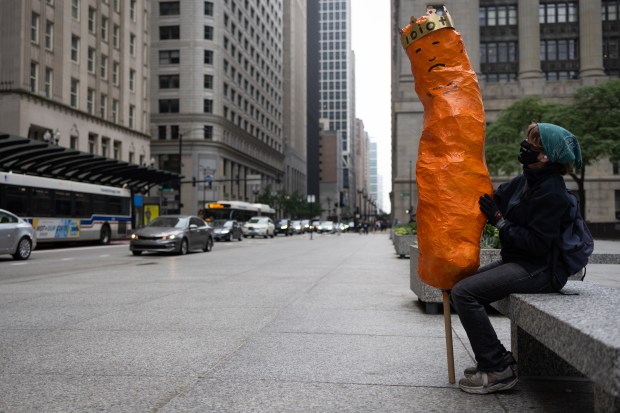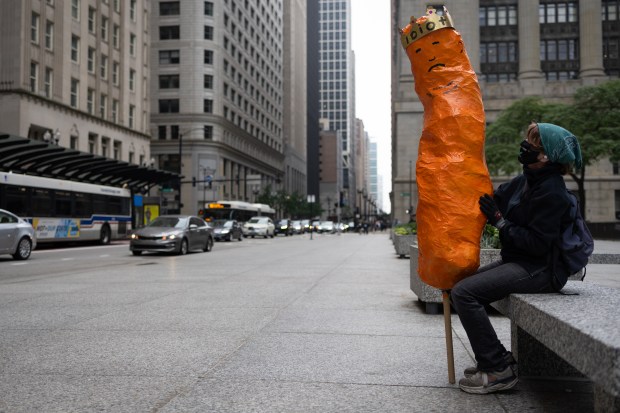Justice Joy Cunningham took an early lead over Appellate Judge Jesse Reyes in unofficial results for the Democratic state Supreme Court seat shortly after polls closed Tuesday.
No Republicans have filed for the Nov. 5 race, which means Tuesday’s winner will likely win the seat. The court’s 5-2 Democratic majority is not expected to change.
Cunningham came into election night as the Democratic party favorite and outraised Reyes by more than fivefold, bringing in more than $850,000 since the beginning of the year. Her central argument was that she was already upholding Democratic values and performing well as an appointed justice.
Illinois Supreme Court Justice Joy Cunningham greets people on primary Election Day, March 19, 2024, outside Truman College in Uptown. (Brian Cassella/Chicago Tribune)Reyes, meanwhile, argued that he was less beholden to the party and represented a rare opportunity to elevate a Latino judge to the high court.
The election comes at a time when state courts have gained unusual attention for their role in protecting access to abortions, following the U.S. Supreme Court’s decision to overturn Roe v. Wade. Reyes and Cunningham have signaled they align with the Democratic mainstream in supporting the right to an abortion, among other issues.
Lisa Holder White, a Republican running unopposed in a separate state Supreme Court district, was expected to win her race according to unofficial results Tuesday evening.
Without a competitive Democratic primary at the top of the ballot, supporters of both candidates noted the expected low turnout before polls closed Tuesday.
Greg Kelley, president of the SEIU Illinois State Council, said well over 100 members between three SEIU locals across the region were working to turn out voters for Cunningham
“We’re at the polls, we’re knocking on doors,” he said Tuesday afternoon.
Still, Kelley acknowledged that “turnout is not what I think we would have hoped.”
“It’s always a little disappointing to see,” he said — though he also noted that low level of participation was expected to help candidates with party backing, including Cunningham.
“From a Latino standpoint, a Latino vote standpoint, I think that is an obvious concern as we go into the night with regard to Justice Reyes,” Martín Montes, a partner at law firm Barnes & Thornburg and a member of the Illinois Latino Agenda, said Tuesday afternoon.
Montes said turnout on Chicago’s Northwest Side stemming from the 20th District state Senate race could motivate more Latino voters to the polls. Progressive get-out-the-vote efforts for Chicago Teachers Union organizer Graciela Guzmán in her challenge against incumbent Sen. Natalie Toro could have been especially helpful to Reyes, he said.
At the same time, Montes acknowledged a contentious race for the 31st District state House — school dean Michael Crawford’s challenge against incumbent Rep. Mary Flowers’ — could have similarly turned out Black voters for Cunningham.
The Supreme Court contest surfaced tensions between Black and Latino leaders, as Reyes fought to become the first and only Latino justice on the high court.
A win for Reyes over Cunningham “would be equally significant as was the appointment of Justice Sonia Sotomayor to the U.S. Supreme Court,” Montes said.
A loss would be “equally significant a disappointment,” he said, particularly because competitive state Supreme Court races are rare.
Cunningham, who is Black, has said she values diversity on the court. But she raised the ire of both Reyes and a handful of Latino groups for comments she made to The Daily Line about the issue.
“I think to suggest that our Supreme Court is not diverse because it does not have a Latino on it, in many respects really makes no sense,” Cunningham told the publication. “I think when the court was completely male and completely white, then you could call it a non-diverse court. But now it has five women; it has three Black people.”
Even before that, Reyes’ supporters and advocates for Latino representation pointed to multiple missed opportunities in recent years for party insiders to help elevate a Latino justice to the high court — including retiring Chief Justice Anne Burke’s decision to appoint Cunningham as her replacement in 2022.
Reyes also raised questions about conflict of interest after the state Supreme Court recently failed to act on a petition to strip convicted former Ald. Ed Burke of his law license.
Judge Jesse Reyes, a candidate for Illinois Supreme Court, greets people on primary Election Day, Tuesday, March 19, 2024, at Manny’s Cafeteria & Delicatessen in the South Loop. (Brian Cassella/Chicago Tribune)The court could not move forward with a petition from the Attorney Registration and Disciplinary Commission because at least four of seven justices recused themselves, according to an order. The former alderman, recently convicted of racketeering, bribery and attempted extortion, is former Justice Burke’s husband.
It’s not clear which justices recused themselves, and they’re not required to provide any reasoning.
“From my standpoint, it’s tarnished our judiciary, and it’s unfortunate that has happened, because it was a decision that could have been made, and all of this could have been avoided,” Reyes said Sunday, campaigning at the South Side Irish St. Patrick’s Day parade.
Cunningham, who’s originally from New York City, had the support of several large labor unions in addition to the party’s backing.
Reyes, who grew up in Pilsen and Bridgeport, was endorsed by U.S. Reps. Jesus “Chuy” Garcia and Delia Ramirez.
Both candidates attended John Marshall Law School.
Kelley, the SEIU leader, characterized the race as “just another reminder to our members of the importance of the courts.”
“As a person who cares about the state of the city, the state and the country, we need to continue to do what we can to educate folks,” he said.




